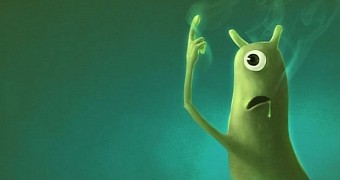Scientists are pretty darn sure that we are not alone in the universe. So much so that, in early April, NASA chief scientist Ellen Stofan promised that we would find proof of alien life within 10 years, 20 if we didn't rush into things and took our time exploring neighboring planets.
When she made this promise, Ellen Stofan was thinking about discovering actual microscopic lifeforms or at least bulletproof evidence that such teeny tiny organisms do, in fact, populate or used to populate other planets in the Solar System or orbs well beyond it.
Interestingly, researcher Fergus Simpson with the University of Barcelona in Spain argues that, if aliens lifeforms actually exist, odds are they aren't microscopic. Au contraire, mathematical models indicate that they're probably about the size of the bears inhabiting our good old Earth.
Thus, in a study titled “The Nature of Inhabited Planets and Their Inhabitants,” University of Barcelona scientist Fergus Simpson proposes that, if real, aliens likely tip the scale at about 300 kilograms (some 660 pounds). Well, better not mess with them then.
How did he settle on this figure?
There are tens of thousands of planets outside the Solar System that is our cosmic home. Statistically speaking, it makes sense to assume that at least some of them provide all the right conditions to allow for the emergence and evolution of alien lifeforms.
To estimate the size of these presumed distant siblings of ours, University of Barcelona researcher Fergus Simpson turned to a branch of mathematics known as Bayesian statistics and to a mathematical model dubbed Bayes' theorem, Live Science explains.
His calculations put the average alien population on an average planet about 1.4 times the size of Earth at about 50 million individuals. In turn, this led the scientist to the conclusion that, being fewer, aliens would surely be considerably bigger than us Earth dwellers.
“Since population density is widely observed to decline with increasing body mass, we conclude that most intelligent species are expected to exceed 300 kilograms [660 pounds],” Fergus Simpson writes in the report detailing his work.
Since it's not all that often that he hear talk of aliens the size of bears, the researcher's paper didn't go unnoticed. However, it wasn't exactly welcomed by the scientific community either. Rather, it was subject to criticism. Then again, maybe future space missions will prove Fergus Simpson right.

 14 DAY TRIAL //
14 DAY TRIAL //